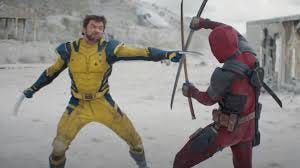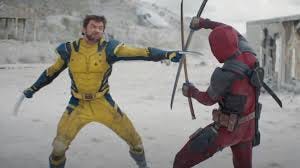Sure, there are plenty of people out there who revere the movies featuring Deadpool, the foul-mouthed, super-violent and supposedly sexually fluid Marvel superhero, but based on the available evidence of the character’s two previous starring vehicles—Deadpool (2016) and Deadpool 2 (2018), not to mention the latter’s PG-13 re-edit Once Upon a Deadpool (2018)—it would seem that the appeal is lost on me. For all the hype of how edgy and daring the films have been, what with the gory fight scenes and the talk (talk only, it should be noted) of pegging and the title character constant breaking of the fourth wall to offer his own MST3K-style commentary to the action as it is happening, they have always struck me as pretty much being the cinematic equivalent of the old shopping mall staple Spencer Gifts—both are entities that use allegedly outrageous humor and pop culture references that supposedly set them apart from the competition to disguise the fact that they are corporate-owned entities being deployed to make their audiences feel hip and with it while selling them the same old shit as everyone else.
This is especially true of the latest installment in the franchise, Deadpool & Wolverine, a film that not only brings Deadpool back for the first time in six years but even offers viewers the chance to see Hugh Jackman once again slip into the role of fan favorite X-Man Wolverine, a character whose arc he brought to a legitimately moving end in Logan, which remains one of the very best of the continuing influx of superhero cinema. This also marks the first time that a Deadpool movie has been made under the aegis of Marvel/Disney and for a while, there was some concern that they might require that future Deadpool films to be PG-13 at most so as not to risk losing family audiences. Let me assure you right now that the film pretty much goes out of its way to fully earn its “R” rating even before the opening credits have concluded and spends the rest of the time pushing the pounds far enough to ensure that the MPAA rating system once again looks like a joke. Unfortunately, the film clearly did not feel the need to put the same effort into coming up with a decent story, funny jokes or a purpose for its existence other than to make tons of money and the result is perhaps the most deeply insufferable comic book-related movie to come along since Joker.
Now comes the tricky part—what exactly can I say about the film here? Within the invite sent out for critics to attend the advance press screening was this: “In order to give audiences around the world the opportunity to enjoy our movies to the fullest and allow them to discover any surprises and plot twists, we respectfully ask that you as press refrain from revealing spoilers, cameos, character developments and detailed story points in your coverage, including on social media.” This in and of itself is not particularly new or ominous—this is relatively standard stuff and only a super-weak writer would spend an entire review just rehashing story points and divulging plot twists and unexpected cameos (though my guess is that many other entities out there will have done just that by the time you read these words). What makes it difficult is that all of it is so meaningless and devoid of import that it is almost impossible to discern what might fall under the heading of “spoilers” and what is merely just more of the filmmakers fucking around.
The film is based around the multiverse concept, a conceit that has of late propped up many a lazy superhero narrative with moments of cheap fan service in which beloved characters from another franchise turn up “unexpectedly” for a few minutes of wackiness/excitement. Here, following the events of Deadpool 2, antihero Wade Wilson (Ryan Reynolds) is struggling to find some purpose—having given up his mercenary ways after unsuccessfully applying to become one of the Avengers, he now spends his days selling cars and his nights pining for lost love Vanessa (Morena Baccarin) following the ending of their relationship. On his birthday, Wade is contacted by Mr. Paradox (Matthew Macfadyen), a representative of the Time Variance Authority, the group charged with monitoring what is going on with all of the various timelines out there. In the hopes of proving himself to his superiors in the hopes of one day controlling the entire TVA, Mr. Paradox has developed a nearly-operational machine dubbed The Time Ripper that will quickly and cleanly bring seemingly unnecessary timelines to abrupt endings (not to mention all of those who live in them). Inevitably, Paradox plans to use it on the Earth-10005 Universe ( a.k.a. us) unless Deadpool. . .
Well, as I think I may be skirting closely towards what that invite referred to as “detailed story points,” I shall not say much more along these lines. Suffice it to say, Deadpool needs to find Wolverine (Jackman)—you saw the title—and when the version beloved by everyone for his heroics turns out to be extremely and irretrievably dead, he visits other timelines until he finds the version who proves to be the most loathed, especially by himself, and the race is on to save Wade’s timeline, and others, from destruction. When the two aren’t punching and stabbing each other—a moot point since both are more or less indestructible—they are laying waste to countless bad guys in increasingly bloody ways, usually to the tune of some iconic pop favorite serving as ironic counterpoint, while encountering a wide variety of characters running the gamut from the mysterious and powerful Cassandra Nova (Emma Corrin) to a number of familiar faces of whom I dare not mention.
I confess that the previous big-screen excursions of Deadpool have more or less left me cold. Sure, the rudeness and brutality on display stands in marked contrast to the generally bloodless and eager-to-please approach taken my the majority of their brethren but once that initial shock has faded away, they have largely proven to be just as tedious as other films of its type in the ways in which they essentially boil down to infinitely forgettable narratives building up to the climactic sight of seeing a bunch of actors in bizarre-looking rubber suits pounding the crap out of each other. Perhaps more significantly, I confess to finding the sentient smirk that is Ryan Reynolds deeply annoying and off-putting—I recognize that many find him drolly amusing but his motormouth snarky persona has always struck me as deeply grating. And yet, while I disliked those movies, they each contained a couple of amusing moments here and there and had storylines that at least went through the rudimentary motions of making some kind of sense in order to reach viewers who may not have been versed in the meanings behind every single one of Deadpool’s insider baseball quips.
Deadpool & Wolverine, on the other hand, dispenses with any notion of telling a coherent story, preferring instead to serve as a collection of in-jokes, arcane references and cameo appearances on a level perhaps not seen since the old Road movies, right down to Deadpool quipping away in a manner that suggests Bob Hope after being stricken with Tourette’s Syndrome. The five credited screenwriters (including Reynolds and director Shawn Levy) might claim that they are being daringly post-modern in taking such a smart-aleck approach to such a hugely expensive production, but so what? All they are doing is the very same thing that a film like Hudson Hawk was unjustly excoriated for doing 30-odd years ago, only with infinitely less wit and cleverness than that sadly maligned film managed to display. What we get here is something that feels as if it was made by and for people who consider Family Guy to be the epitome of American humor—the film bro contingent determined to knowingly and demonstrably respond to every ironic quip, pop culture reference and grotesque visual with the kind of obnoxious Pavlovian reaction not seen in a multiplex since that brief dark period in our history in which Snakes on a Plane was a thing.
Case in point. As mentioned earlier, this is the first Deadpool movie made under the official auspices of Disney, who acquired Marvel back in 2009, after having the previous ones produced by Fox. Inevitably, there are a number of self-referential jokes throughout making snarky comments regarding both the property’s past and current owners, many of which I suspect will seem rather bewildering to those of you out there who are not professionally obligated to track the behind-the-scenes maneuverings regarding Hollywood deal making. (If this is the case, do not announce this in the theater because if you do, I fear that any number of those aforementioned film bros will swoop in to explain the entire thing with a level of granular detail that will make you want to set yourself on fire in the hopes that it might bring either the monologue or you to a merciful end.) In theory, this sounds like a bit of cheeky, bite-the-hand-that-feeds-us humor, a comedy staple that works as long as it gives you a sense that those responsible are genuinely getting away with something. Here, these jokes fall flat because a.) they aren’t particularly funny but, more significantly, b.) since Disney also owns Fox, the hoped-for edginess ends up curdling into a sense of smug self-awareness that makes it feel at times like the world’s most expensive version of the kind of skit that the HR department at an especially humorless corporation might put on at a holiday party to show that they can cut loose even when it isn’t Casual Friday.
Speaking of smug self-awareness, the performance by Reynolds is as deeply irritating as ever. He doesn’t act so much as he merely comments on everything around him and while the sight of him riffing and scatting (often in the most scatological ways imaginable) may continue to strike fans of the series as endlessly amusing, others are likely to be far less amused—he may be trying to solidify his position as the Chevy Chase for our times, but did it have to be the one from Fletch Lives? By comparison, Jackman does as well as he can under the circumstances in his long-awaited return to the character that helped make him a star—he lends the project what trace elements of gravitas it maintains and scores some laughs as well with his comparative underplaying—but even so, it is a little depressing to watch him as he renders the powerful wrap-up he gave the character that served him long and well in Logan into little more than the unwitting setup to a not-particularly-witty joke.
Considering that there are approximately 17,000 jokes on hand in Deadpool and Wolverine, I will concede that there are a few of them that do land reasonably well and a couple of the much-hyped top-secret cameos are somewhat fun as well. However, those brief glimmers of amusement only serve to highlight just how sloppy, disorganized and unfunny the vast majority of it really is. What makes that even more depressing is that for the majority of the audience clamoring to see this thing, the blatant fan-servicing nature of the entire enterprise will no doubt distract them enough from recognizing just how hollow and lazy it really is. Will it make hundreds of millions of dollars at the box office, even with the “R” rating. Almost certainly, especially since, with the exceptions of the new M Night/ Shyamalan thing and the Disney-produced Alien: Romulus, it is pretty much the last big shot from this year’s strange, strike-shortened summer movie season. Will anyone outside of passionate Deadpool devotees actually remember anything about it a year or so from now? If they are lucky, no.




